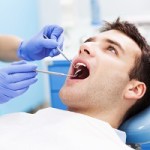Written by Greg Arnold, DC, CSCS. Study participants with gingivitis, who supplemented daily for 12 weeks with a probiotic containing Lactobacillus plantarum, significantly improved probing depth and plaque index compared to the control group.
 Periodontal disease occurs when the gums and bone supporting the teeth become inflamed and infected. In its early stages it is known as gingivitis, where gums are swollen and may bleed. However, if gingivitis persists, it can develop into periodontitis and ultimately result in tooth loss 1.
Periodontal disease occurs when the gums and bone supporting the teeth become inflamed and infected. In its early stages it is known as gingivitis, where gums are swollen and may bleed. However, if gingivitis persists, it can develop into periodontitis and ultimately result in tooth loss 1.
A 2012 study of periodontal disease in the United States found that 64.7 million adults had periodontal disease2. According to the 2010 Global Burden of Disease Study, indirect costs due to dental disease worldwide were US $144 billion yearly, suggesting that the global economic impact of dental disease amounted to US $442 billion 3.
In a 2016 study 4, 36 patients (13 men, 23 women) between the ages of 59 and 76 undergoing “supportive periodontal therapy” received either 1 capsule of a probiotic (17 subjects) or a placebo (dextrin = 19 subjects) per day for 12 weeks. The probiotic used was 10 milligrams of heat-killed Lactobacillus plantarum (HK L-137) which was isolated from fermented food. Clinical parameters, including plaque index (PI), gingival index (GI), bleeding on probing (BOP) and probing depth (PD) were scored at baseline and weeks 4, 8, and 12 along with supportive periodontal therapy (SPT).
After 12 weeks, researchers saw a statistically significant improvement in an aspect of dental health called probing depth. When a tooth has a deep probing depth, it is prone to infection by bacteria and viruses 5,6. The researchers used 4 millimeters as a threshold for significant probing depth. The researchers noted that those in the probiotic group saw a 31.5% decrease in the number of teeth with a probing depth >4 mm (3.5 to 2.4) compared to a 17.1% decrease in the placebo group (4.1 to 3.4) (p = 0.001).
In addition, those in the probiotic group saw a 22.3% decrease in the number of total sites in the mouth with a probing depth >4 mm (5.4 to 4.2) compared to a 20.4% increase in the placebo group (4.9 to 5.9) (p = 0.006). No statistical differences were seen between the two groups regarding other measures of dental health, including plaque index (p = 0.100) and gingival index (p = 0.872).
When suggesting a mechanism for the health effects of heat-killed Lactobacillus plantarum, the researchers pointed to the ability of HK L-137 to increase activity of immune system proteins IL-12 and T-helper-1 7-9 as well as strong anti-viral properties 10. They went on to conclude that “daily HK L-137 intake can decrease the depth of periodontal pockets in patients undergoing supportive periodontal therapy.”
Source: Iwasaki, Kazuto, Kenta Maeda, Kouki Hidaka, Kenji Nemoto, Yoshitaka Hirose, Shinji Deguchi, Kazuto Iwasaki et al. “Daily Intake of Heat-killed Lactobacillus plantarum L-137 Decreases the Probing Depth in Patients Undergoing Supportive Periodontal Therapy.” Oral health & preventive dentistry 14, no. 3 (2016): 207-214.
Copyright © by Quintessence. All Rights Reserved.
Greg Arnold is a Chiropractic Physician practicing in Hauppauge, NY. You can contact Dr. Arnold directly by emailing him at PitchingDoc@msn.com or visiting his web site at www.PitchingDoc.com.
Posted July 13, 2017.
References:
- CDC. Periodontal Disease. 2015; overview of periodontal disease. Available at: https://www.cdc.gov/oralhealth/periodontal_disease/index.htm. Accessed July 12, 2017, 2017.
- Eke PI, Dye B, Wei L, Thornton-Evans G, Genco R. Prevalence of periodontitis in adults in the United States: 2009 and 2010. Journal of dental research. 2012;91(10):914-920.
- Listl S, Galloway J, Mossey P, Marcenes W. Global economic impact of dental diseases. Journal of dental research. 2015;94(10):1355-1361.
- Iwasaki K, Maeda K, Hidaka K, et al. Daily Intake of Heat-killed Lactobacillus plantarum L-137 Decreases the Probing Depth in Patients Undergoing Supportive Periodontal Therapy. Oral health & preventive dentistry. 2016;14(3):207-214.
- Saglie R, Newman M, Carranza Jr F, Pattison G. Bacterial invasion of gingiva in advanced periodontitis in humans. Journal of periodontology. 1982;53(4):217-222.
- Rateitschak‐Plüss EM, Schwarz JP, Guggenheim R, Duggelin M, Rateitschak KH. Non‐surgical periodontal treatment: where are the limits? Journal of Clinical Periodontology. 1992;19(4):240-244.
- Murosaki S, Yamamoto Y, Ito K, et al. Heat-killed Lactobacillus plantarum L-137 suppresses naturally fed antigen–specific IgE production by stimulation of IL-12 production in mice. Journal of Allergy and Clinical Immunology. 1998;102(1):57-64.
- Murosaki S, Muroyama K, Yamamoto Y, KUSAKA H, LIU T, YOSHIKAI Y. Immunopotentiating activity of nigerooligosaccharides for the T helper 1-like immune response in mice. Bioscience, biotechnology, and biochemistry. 1999;63(2):373-378.
- Murosaki S, Muroyama K, Yamamoto Y, Yoshikai Y. Antitumor effect of heat-killed Lactobacillus plantarum L-137 through restoration of impaired interleukin-12 production in tumor-bearing mice. Cancer Immunology, Immunotherapy. 2000;49(3):157-164.
- Maeda N, Nakamura R, Hirose Y, et al. Oral administration of heat-killed Lactobacillus plantarum L-137 enhances protection against influenza virus infection by stimulation of type I interferon production in mice. International immunopharmacology. 2009;9(9):1122-1125.
